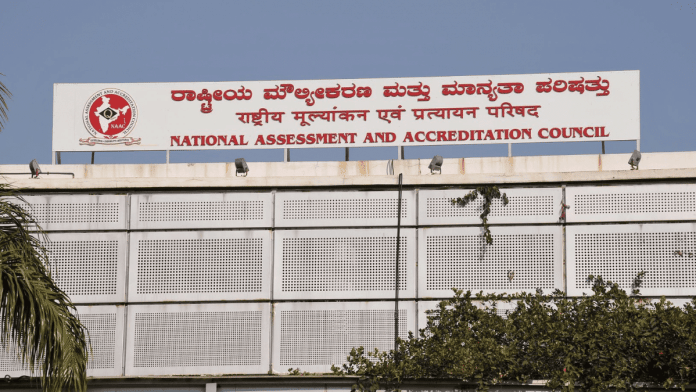New Delhi: The National Assessment and Accreditation Council (NAAC), under scrutiny over allegations of corruption and misconduct, is set to launch a reformed accreditation system that will classify institutions as either accredited or not, replacing the previous grading method with a new “maturity-based grading system”, which will make it more difficult for institutions to achieve higher grades.
NAAC, an autonomous body under the University Grants Commission (UGC), assesses and certifies higher educational institutions through a formal accreditation process based on various academic and administrative parameters.
Anil D. Sahasrabudhe, Chairman of the Executive Committee of NAAC, told ThePrint the new binary accreditation system would soon be launched to establish a minimum quality benchmark for all institutions while encouraging them to progress through a “maturity-based grading” scale from level one to five.
“For a long time, we had stopped accepting new institutions for accreditation to clear the existing backlog. We are almost done with that, and now a new portal, which will be accessible to the public, will be launched soon,” he said.
The council has come under fire for alleged corruption and discrepancies in its assessment process. In February, the CBI arrested members of an NAAC inspection committee in connection with a bribery case involving favourable accreditation ratings for Koneru Lakshmaiah Education Foundation (KLEF) in Guntur. Following this incident, NAAC removed over 900 assessors and announced that it would conduct assessments exclusively online.
Earlier in November 2022, the Union Ministry of Education set up a four-member panel led by K. Radhakrishnan, chairperson of the Board of Governors at IIT Kanpur, to recommend measures for strengthening the assessment and accreditation process. The panel has since submitted its recommendations, which the council is now set to implement.
How will the new system be different?
Under the existing system, institutions are graded on a scale from A++ to C, with D indicating no accreditation. NAAC accreditation is valid for five years, during which institutions are expected to demonstrate continuous improvement.
A high NAAC score provides several benefits, including greater autonomy. However, there have been allegations that some institutions used unlawful means, including bribing members of the NAAC inspection committee—who are selected from a pool of experts—to secure better grades. These grades are widely advertised to attract students and parents.
However, under the new norms, this grading system will be discontinued. Higher education institutions will first be classified as either accredited or non-accredited, and then they will progress through maturity levels from one to five, depending on demonstrated improvement.
“But it will not be easy to progress from level one to level four. Levels one and two may be attainable for comparatively good institutions, while level three should be reserved for very good institutions. Levels four and five will be out of reach for most institutions,” Sahasrabudhe said.
The Council will release further details of this new maturity-based grading system once the new portal is launched.
“The new system will be based on trust and data-driven processes, with minimal physical visits to institutions for verification; however, it will impose heavy penalties for false submissions,” he said.
Stricter SOPs for verification
The verification of information will be conducted entirely online for colleges and physically for universities. The Council has also revised its Standard Operating Procedures (SOPs) for both processes.
For online verification, colleges will be informed about the assessors only one day in advance. In the case of physical visits, universities will be notified two days prior. Accommodation and local travel arrangements for the two-member team of assessors will be coordinated by NAAC.
According to the updated SOPs, universities are strictly prohibited from organising any form of welcome for the visiting team or offering any gifts.
“There is a clear reiteration that there must be no give-and-take, no conflict of interest, and team members are now required to provide formal undertakings,” said Sahasrabudhe.
“No one can claim with 100 percent certainty that everyone is entirely above reproach when it comes to integrity. That’s why we remain vigilant. Even the smallest incident is taken very seriously, and we act strictly to address and remove such issues. That’s how the system gets cleaned up,” he added.
(Edited by Sugita Katyal)
Also read: How UGC’s new rating system for higher institutions sets stage for flashpoint with non-NDA states






